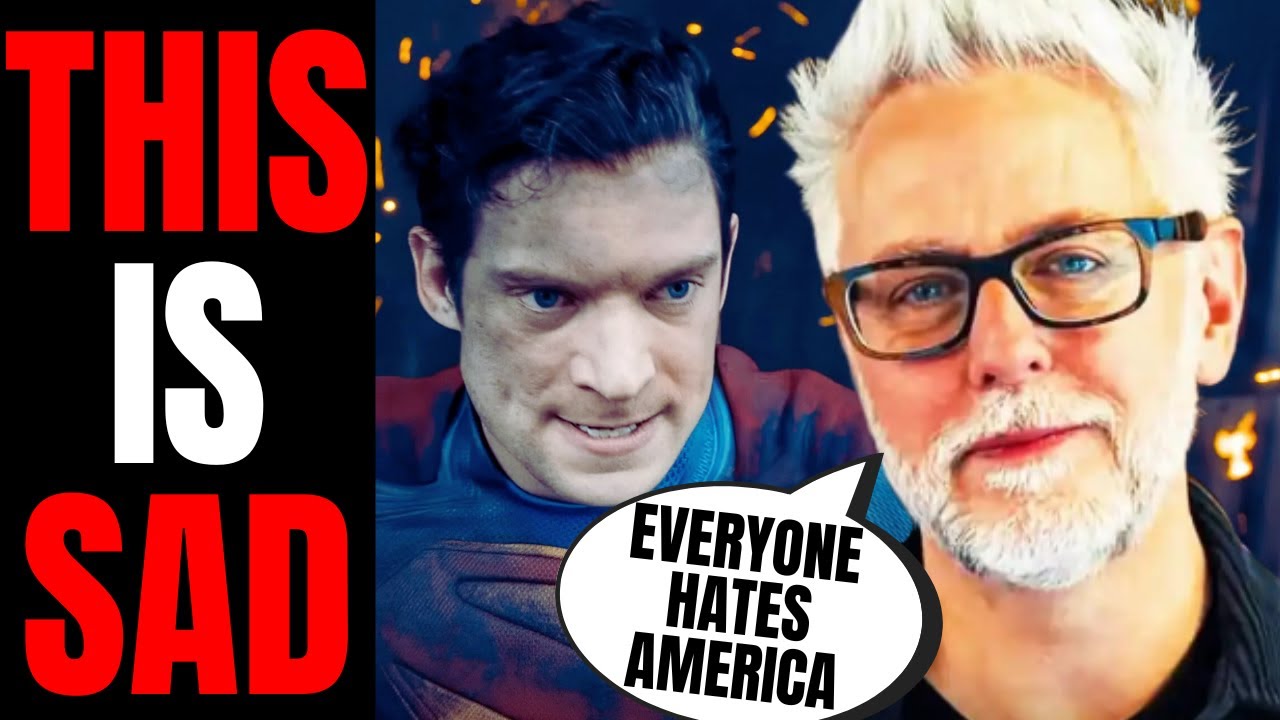Superman’s Kryptonite? 😲 James Gunn claims global “anti-American” hate is sinking Superman’s box office! Is the Man of Steel’s legacy crumbling, or is this just a Hollywood excuse? 🤔 Uncover the truth behind the controversy! 👉

When James Gunn’s Superman soared into theaters on July 11, 2025, it carried the weight of launching a rebooted DC Universe (DCU), aiming to rival Marvel’s cinematic juggernaut. With a $225 million production budget and $200 million in marketing, the film, starring David Corenswet as the Man of Steel, opened to a solid $122–125 million in North America, securing an A- CinemaScore and an 88% audience score on Rotten Tomatoes. Yet, its international haul of $171 million after two weeks, part of a $406–409 million global total, has lagged, prompting Gunn to attribute the shortfall to “anti-American sentiment” in interviews with Rolling Stone and Entertainment Weekly. This bold claim, amplified by posts on X like @Variety and @ZSharf, has sparked a firestorm, with critics accusing Gunn of deflecting from creative missteps and supporters arguing he’s highlighting a real cultural barrier. The reality lies in a complex interplay of global market dynamics, political polarization, and the evolving appeal of superhero films, revealing more about Hollywood’s challenges than a singular anti-American narrative.
Gunn’s assertion hinges on the idea that Superman, a quintessentially American icon, faces resistance abroad due to geopolitical perceptions. He told Rolling Stone that “Superman is not a known commodity in some places like Batman is,” adding, “we have a certain amount of anti-American sentiment around the world right now. It isn’t really helping us.” This view gained traction after the film’s dismal performance in China, where it grossed just $8.2 million, plummeting 95.9% in its second Friday, as noted by X user @Luiz_Fernando_J. Yet, this explanation falters when contrasted with other American-centric films. Top Gun: Maverick (2022), steeped in patriotic imagery, amassed $782 million internationally, and Mission: Impossible – The Final Reckoning (2025) earned $393 million, proving that American iconography isn’t inherently box-office poison. These successes suggest that compelling storytelling and universal appeal can transcend cultural biases, casting doubt on Gunn’s blanket claim.
The controversy stems partly from Gunn’s earlier comments to The Times of London, where he framed Superman as “the story of America” and an “immigrant” narrative, reflecting the origins of creators Jerry Siegel and Joe Shuster, sons of Jewish immigrants. This sparked a conservative backlash, with Fox News labeling the film “SuperWoke” and Kellyanne Conway on The Five arguing that audiences “don’t go to the movie theater to be lectured”. Dean Cain, a former Superman, called the politicization a “mistake” that could hurt box office numbers, referencing the shift from “Truth, Justice, and the American Way” to “Truth, Justice, and a Better Tomorrow”. On X, @BobDigi69 echoed this, alleging the film’s “blatant political statements” about Israel further alienated audiences. Gunn countered in Entertainment Weekly, emphasizing that the film’s core is about “kindness” rather than politics, questioning what elements were deemed “woke”. His brother, Sean Gunn, defended the immigrant angle, stating on X via @Variety that rejecting it is “against the American way”.
This polarized discourse mirrors recent Hollywood controversies, like the “Not My Zelda” backlash over Nintendo’s casting choices, where accusations of “woke” pandering clashed with calls for representation. Similarly, The Marvels and The Fantastic Four: First Steps faced “woke” criticism yet maintained strong audience scores, suggesting that social media outrage, often amplified by figures like @YellowFlashGuy, doesn’t always translate to box office failure. Superman’s domestic success—$235 million in 10 days, projected to hit $300–350 million—shows robust American support, particularly in Brazil and the UK, where weekday numbers indicate positive word-of-mouth. The international shortfall, especially in China, may owe more to superhero fatigue and local market dynamics than anti-Americanism. China’s box office has increasingly favored domestic films, and superhero movies, except for Spider-Man: No Way Home, have struggled there since 2020.
Gunn’s focus on “anti-American sentiment” also sidesteps creative critiques. A Forbes review called Superman “mediocre” and “generic,” citing tonal inconsistency—oscillating between corny optimism and grim cynicism—and a predictable third-act calamity with no real stakes. David Corenswet’s performance as a “gosh golly” Superman is praised, but the film’s sprawling cast and underdeveloped characters, like the Daily Planet staff, dilute its impact. NPR’s Glen Weldon, a Superman scholar, lauded its sincerity and humor, noting Corenswet’s “golly” as quintessentially Superman, but acknowledged its smaller scope compared to grander predecessors like Richard Donner’s 1978 film. These mixed reviews suggest that while Superman resonates with fans seeking a hopeful hero, its narrative flaws may hinder universal appeal, especially in markets less familiar with the character.
The broader industry context complicates Gunn’s narrative. The MCU’s recent struggles—The Marvels’ $237 million loss, Thunderbolts’ underperformance, and Ant-Man and the Wasp: Quantumania’s lukewarm reception—highlight a global superhero fatigue, intensified by oversaturation. DC’s own history, from Zack Snyder’s divisive “Snyderverse” to The Batman’s success, shows that execution trumps brand alone. Gunn’s pivot to a lighter, more accessible Superman was meant to counter Snyder’s gritty vision, but Forbes argues it overcorrects, failing to settle on a cohesive tone. Meanwhile, Jurassic World Rebirth’s $648 million global haul shows audiences still flock to spectacle-driven franchises, suggesting Superman’s struggles may stem from creative missteps rather than geopolitical bias.
Gunn’s claim also ignores practical factors. Superman’s lesser global recognition, as he noted, is significant—Batman’s darker, universal archetype resonates more in markets like Asia, where The Batman earned $772 million. China’s market, crucial for blockbusters, has been tough for superhero films, with Superman’s $8.2 million cume reflecting local disinterest rather than anti-Americanism. The film’s marketing, heavily centered on Gunn himself, may have backfired, as Cosmic Book News suggests, noting his prominence could alienate international viewers wary of Hollywood’s cultural exports. Yet, Gunn’s optimism—calling the film a “total win” for launching the DCU—aligns with strong domestic buzz and a projected $500–600 million global total, sufficient to lead 2025’s superhero films.
The “anti-American” narrative feels like a convenient deflection, much like Ubisoft’s Yves Guillemot blaming Disney for Star Wars Outlaws’ failure. Both cases shift focus from internal issues—unpolished gameplay for Outlaws, tonal inconsistency for Superman—to external scapegoats. While global perceptions of America, shaped by trade policies and political rhetoric, may influence some markets, successes like Top Gun: Maverick prove that quality storytelling overrides such barriers. Superman’s domestic strength and positive word-of-mouth suggest it could still grow internationally, but Gunn’s comments risk amplifying division rather than bridging it. As Hollywood navigates a polarized world, Superman’s fate underscores that even the Man of Steel needs more than a cape—it requires a story that soars universally, not just in America’s heartland.





